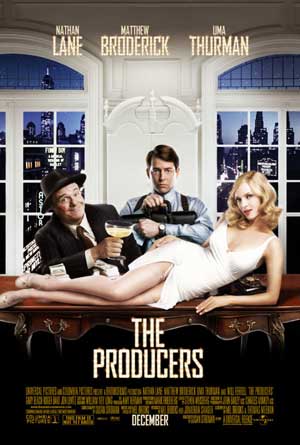 The two hours I spent in the theater watching The Producers were the two most fun hours I have had in a movie theater this year. The adaptation of the Broadway musical version of Mel Brooks’ original movie pops, crackling energy from the screen even though it’s completely stagey.
The two hours I spent in the theater watching The Producers were the two most fun hours I have had in a movie theater this year. The adaptation of the Broadway musical version of Mel Brooks’ original movie pops, crackling energy from the screen even though it’s completely stagey.
The story is simple – Max Bialystock is a washed up Broadway producer who can’t come up with a hit. Leo Bloom is the accountant who comes to do the books for his latest flop. Bloom, whose secret ambition is to one day be a Broadway producer himself, comes upon a funny fact – you can make more money off a flop show than you can off of a hit, because you never need pay back the investors. Bialystock is thunderstruck – surely he can come up with a surefire bomb, and he can oversell shares in the show like crazy. What he ends up with is a musical about World War II called Springtime for Hitler, written by a Nazi and directed by and starring a flaming gay man.
Of course it’s a hit.
That’s the whole story of The Producers, Brooks’ directorial debut and first masterpiece. It’s a story that lives in the telling, and the Broadway version, against all odds, told the same tale in a new way that resonated with audiences. Now most of the original cast (Nathan Lane returns in the Zero Mostel role of Bialystock and Matthew Broderick steps in for Gene Wilder as Bloom) plus new additions like Will Ferrell as the Nazi playwright and Uma Thurman as the leggy secretary Ulla, brings that show to the screen very faithfully. And that’s where many people are going to lose the movie.
The Producers doesn’t look like a David Fincher film; Susan Stroman, who directed the original cast on Broadway, keeps her shots simple – tight and wide, and that’s about it. And the blocking looks like it came right off the stage. Nobody is going to be claiming that Stroman reinvented the musical (although I will say that the stagey aspects of it (and the look of the film itself, especially the colors) reminded me very much of MGM musicals from the 30s and 40s, which really isn’t the worst thing), but they have to admit that she brought something else from the stage show – the energy that almost only comes with live performance.
Everybody plays it big, and I wouldn’t want it any other way. Could Roger DeBris and Carmen Ghia, the flaming gay duo (played wonderfully by Gary Beach and a completely show-stealing Roger Bart, looking like the Queerest Vulcan), be played small? Who wants to watch Nathan Lane be reserved as Bialystock? Hell, the original film was broad, and everything is twenty times bigger for the stage show. You certainly don’t hire Will Ferrell as a Nazi if you’re interested in playing it small.
The songs remain unchanged from stage, and they carry the same wit and zing. Stroman’s take on the material, again, isn’t terribly cinematic, but I found myself applauding after a bunch of the numbers. Stagey doesn’t have to be stagnant; here it’s imbued with the feel of a live performance. Maybe Nathan Lane had a number of takes on his jail cell song Betrayed, but you can still feel the sweat coming off the screen.
Someone complained to me that all the funniest bits in this film came from the original. So? I had no problem with the fidelity to the original film – I like that this is the 1968 film plus songs. Why completely change something that worked in the first place? And as someone who hasn’t seen the Broadway version on stage I have to say that many of the songs held hilarious surprises – Mel Brooks is still a great jokewriter as a lyricist.
A musical should send you out into the streets singing the songs, clamoring for the soundtrack. The Producers did that for me – I walked out with songs on my lips and a stitch in my side from laughing so hard.